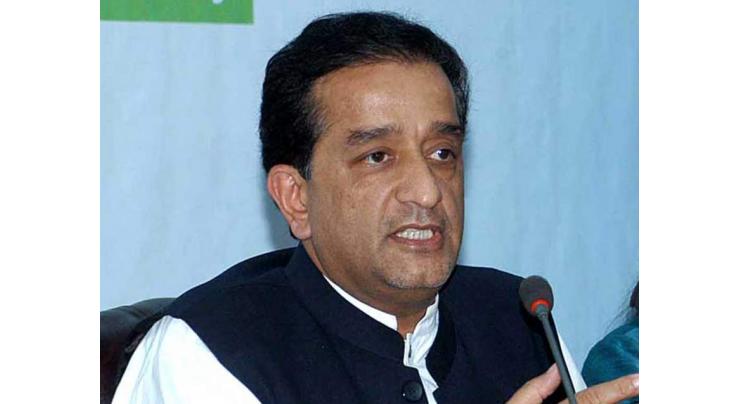
- Home
- Pakistan
- News
- Rs 8 b allocation for 10BTT shows govt's sincerity for green cover: Malik Amin Aslam
Rs 8 B Allocation For 10BTT Shows Govt's Sincerity For Green Cover: Malik Amin Aslam
Mohammad Ali (@ChaudhryMAli88) Published July 31, 2019 | 07:34 PM

Adviser to the Prime Minister on Climate Change Malik Amin Aslam Wednesday said the government had allocated Rs 8 billion for 10 Billion Tree Tsunami (10BTT) despite economic crunch to revive the green cover across the country
"The global average shows 35 per cent of world land prone to desertification where this ratio in Pakistan is 75 per cent. The Oxford research conducted in this regard found tree plantation one of the most cheapest, effective and quickest solutions to curb desertification and climate change," he said.
He was speaking at a seminar on 'Combating Desertification in Pakistan', which was jointly organised here by Sustainable Land Management Programme (SLMP) and Pir Mehr Ali Shah Arid Agriculture University Rawalpindi.
Amin Aslam said the budgetary allocation for tree plantation showed government's sincerity towards environmental conservation.
"It is the only project on which all the provinces are on on board and eager to contribute their share. The Ministry of Climate Change has prepared all the plans for implementation of the mega plantation programme," he added.
The advisor said desertification, biodiversity and climate change were interlinked."If you start reducing desertification and combating climate change then it will help reviving biodiversity in the region." Amin Aslam said desertification was a major challenge to sustainable development in the country.
He said China had recently invited "us to visit Kubuki Desert in its north region, which has been developed into a forest sprawling over 6,000 square kilometers during the last 20 years." The Chinese, he said, were delighted to see Pakistan's efforts for environment conservation, particularly the Billion Tree Tsunami (BTT) project and wanted to partake in such initiatives.
He mentioned that during the China visit, he had also met Executive Secretary of the United Nations Convention to Combat Desertification (UNCCD) and the UN Under-Secretary-General Ibrahim Thiaw.
The UNCCD chair had appreciated the BTT implemented in Khyber Pakhtunkhwa.
"The BTT has been checked by World Wildlife Fund for Nature, International Union for Conservation of Nature and World Economic Forum and has given it a three star rating." He said Prime Minister Imran Khan had given the vision to the nation to work diligently to accomplish the ambitions.
Amin Aslam thanked PMAS Arid Agriculture University, Rawalpindi for holding the important event to mark the World Day to Combat Desertification. The theme of the day for the year was "Lets grow the future together." Vice Chancellor Prof. Dr Qamar-uz-Zaman highlighted the role the university was playing for better climate in the country.
He emphasized that such collaborative activities must be strengthened and taken forward for fighting desertification in Pakistan.
Earlier, National Programme Coordinator (SLMP-II) briefed the audience about the World Desertification Day and about SLMP approaches and interventions that aimed for effective environmental management for combating desertification, land degradation and drought in Pakistan.
"The implementation of the programme will bring considerable financial benefits for the poor dryland communities through the sustainable management of their land resources," he added.
The World Day to Combat Desertification is observed every year globally to promote public awareness of international efforts to combat desertification. Pakistan is signatory to UNCCD. In order to meet the objectives of the convention, the government of Pakistan, with support from UNDP and Global Environment Facility (GEF) is implementing second phase of the Sustainable Land Management Program (SLMP-II) in fourteen dryland districts of all four provinces.
Related Topics
Recent Stories

PTI to stage nationwide protests against alleged electoral frauds

Senate continues discussion on Presidential address to Joint Sitting of Parliame ..

Masood Khan calls for Pak-US cooperation for regional peace

Interior Minister starts Margalla Trail Patrol for security

Currency Rate In Pakistan - Dollar, Euro, Pound, Riyal Rates On 26 April 2024

Today Gold Rate in Pakistan 26 April 2024

ICC Womens T20 World Cup Qualifier, Match 2: Ireland Women open with Comfortable ..

Robinson, bowlers help New Zealand go 2-1 up against Pakistan

Shahzeb Chachar to hold khuli kachehri on April 26

Heatwave amid Israel's aggression in Gaza brings new misery, disease risk

Tourism must change, mayor says as Venice launches entry fee

Court adjourns Judicial Complex attack case till May 17
More Stories From Pakistan
-
SSUET convocation held, 1177 degrees awarded
9 minutes ago -
Frequent leaks of papers make matric exams controversial in KP
9 minutes ago -
Seven tubewells of WSSP converted to solar power
9 minutes ago -
ISSI holds in-house session on elections in India
18 minutes ago -
Gomal university computerises working for enhanced transparency
18 minutes ago -
PAL, SNHF to organize an interactive session with writers
28 minutes ago
-
24 arrested, weapons narcotics recovered
29 minutes ago -
Two-day int’l conference on advances in seed storage techniques held at UAP
29 minutes ago -
Partly cloudy weather forecast
29 minutes ago -
Meeting held to review arrangements for dengue control
38 minutes ago -
Aror University organizes int'l conference on interfaith religious diplomacy in Indus valley
38 minutes ago -
Police claim to arrest woman for kidnapping infant
38 minutes ago